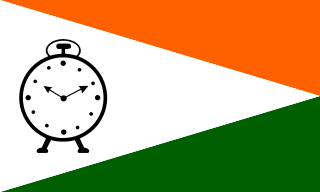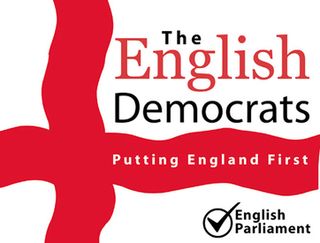
The Free Democratic Party is a liberal and classical liberal political party in Germany. The FDP is led by Christian Lindner.
Mali is located in Africa. The history of the territory of modern Mali may be divided into:
The Natural Law Party (NLP) is a transnational party founded in 1992 on "the principles of Transcendental Meditation", the laws of nature, and their application to all levels of government. At its peak, it was active in up to 74 countries; it continues in India and some parts of the United States. The party defines "natural law" as the organizing intelligence which governs the natural universe. The Natural Law Party advocates using the Transcendental Meditation technique and the TM-Sidhi program as tools to enliven natural law and reduce or eliminate problems in society.
Sinn Féin is a left-wing Irish republican political party active in both the Republic of Ireland and Northern Ireland.

The Bharatiya Janata Party is one of the two major political parties in India, along with the Indian National Congress. As of 2018, it is the country's largest political party in terms of representation in the national parliament and state assemblies, and it is the world's largest party in terms of primary membership. BJP is a right-wing party, and its policy has historically reflected Hindu nationalist positions. It has close ideological and organisational links to the Rashtriya Swayamsevak Sangh (RSS).

The Indian National Congress(pronunciation ) is a broadly based political party in India. Founded in 1885, it was the first modern nationalist movement to emerge in the British Empire in Asia and Africa. From the late 19th century, and especially after 1920, under the leadership of Mahatma Gandhi, Congress became the principal leader of the Indian independence movement. Congress led India to independence from Great Britain, and powerfully influenced other anti-colonial nationalist movements in the British Empire.

The Austrian People's Party is a conservative Christian-democratic political party in Austria. A successor to the Christian Social Party of the late 19th and early 20th centuries, it was founded immediately following the reestablishment of the Republic of Austria in 1945 and since then has been one of the two largest Austrian political parties with the Social Democratic Party of Austria (SPÖ). In federal governance, the ÖVP has spent most of the postwar era in a grand coalition with the SPÖ. Most recently, it has been junior partner in a coalition government with the SPÖ since 2007. However, the ÖVP won the 2017 election, having the greatest number of seats and formed a coalition with the far-right Freedom Party of Austria (FPÖ). Its chairman Sebastian Kurz is the youngest Chancellor in Austrian history.

A first-past-the-post electoral system is one in which voters indicate on a ballot the candidate of their choice, and the candidate who receives the most votes wins. This is sometimes described as winner takes all. First-past-the-post voting is a plurality voting method. FPTP is a common, but not universal, feature of electoral systems with single-member electoral divisions, and is practiced in close to one third of countries. Notable examples include Canada, India, the United Kingdom, and the United States, as well as most of their current or former colonies and protectorates.

The 1945 United Kingdom general election was held on 5 July 1945, with polls in some constituencies delayed until 12 July and in Nelson and Colne until 19 July, because of local wakes weeks. The results were counted and declared on 26 July, to allow time to transport the votes of those serving overseas.

The Nationalist Congress Party (NCP) is a national level political party in India.

The English Democrats is an English nationalist political party in England.

Moussa Traoré is a Malian soldier and politician who was President of Mali from 1968 to 1991. As a Lieutenant, he led the military ousting of President Modibo Keïta in 1968. Thereafter he served as head of state until March 1991, when he was overthrown by popular protests and a military coup. He was twice condemned to death in the 1990s, but eventually pardoned on both occasions and freed in 2002. He has since retired from political life.
An independent voter, often also called an unaffiliated voter in the United States, is a voter who does not align themselves with a political party. An independent is variously defined as a voter who votes for candidates on issues rather than on the basis of a political ideology or partisanship; a voter who does not have long-standing loyalty to, or identification with, a political party; a voter who does not usually vote for the same political party from election to election; or a voter who self-describes as an independent.
The Labour Party is a centre-left political party in the United Kingdom which has been described as an alliance of social democrats, democratic socialists and trade unionists. The party's platform emphasises greater state intervention, social justice and strengthening workers' rights.

General elections were held in Mali on 19 June 1979. They followed a 1974 referendum that approved a new constitution allowing for the direct election of the President for the first time. The country was a one-party state at the time, with the Democratic Union of the Malian People (UDPM) as the sole legal party. Its leader, Moussa Traoré, who had overthrown Modibo Keïta in 1968, was the only presidential candidate, and was elected unopposed. In the National Assembly elections several UDPM candidates were able to contest each seat, with 44% of the incumbent MPs defeated. Voter turnout was reported to be 97%.

General elections were held in Mali on 9 June 1985. The country was a one-party state at the time, with the Democratic Union of the Malian People (UDPM) as the sole legal party. Its leader, Moussa Traoré, was the only candidate in the presidential election, and was elected unopposed. In the National Assembly elections several UDPM candidates were able to contest each seat.
The National Youth Union of Mali was a youth organization in Mali. UNJM was the youth wing of the ruling UDPM. UNJM held its first national council meeting in 1979. Mahamadou Baba Diallo served as the general secretary of UNJM.











